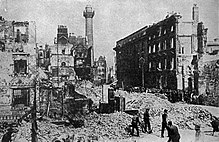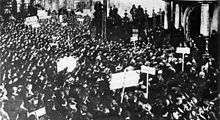Support
In the Balkans, Yugoslav nationalists such as the leader, Ante Trumbić, strongly supported the war, desiring the freedom of Yugoslavs from Austria-Hungary and other foreign powers and the creation of an independent Yugoslavia. The Yugoslav Committee was formed in Paris on 30 April 1915 but shortly moved its office to London; Trumbić led the Committee.[289] In April 1918, the Rome Congress of Oppressed Nationalities met, including Czechoslovak, Italian, Polish, Transylvanian, and Yugoslav representatives who urged the Allies to support national self-determination for the peoples residing within Austria-Hungary.[290]
In the Middle East, Arab nationalism soared in Ottoman territories in response to the rise of Turkish nationalism during the war, with Arab nationalist leaders advocating the creation of a pan-Arab state. In 1916, the Arab Revolt began in Ottoman-controlled territories of the Middle East in an effort to achieve independence.[291]
A number of socialist parties initially supported the war when it began in August 1914.[290] But European socialists split on national lines, with the concept of class conflict held by radical socialists such as Marxists and syndicalists being overborne by their patriotic support for war.[292] Once the war began, Austrian, British, French, German, and Russian socialists followed the rising nationalist current by supporting their countries' intervention in the war.[293]
Italian nationalism was stirred by the outbreak of the war and was initially strongly supported by a variety of political factions. One of the most prominent and popular Italian nationalist supporters of the war was Gabriele d'Annunzio, who promoted Italian irredentism and helped sway the Italian public to support intervention in the war.[294] The Italian Liberal Party, under the leadership of Paolo Boselli, promoted intervention in the war on the side of the Allies and utilised the Dante Alighieri Society to promote Italian nationalism.[295] Italian socialists were divided on whether to support the war or oppose it; some were militant supporters of the war, including Benito Mussolini and Leonida Bissolati.[296]However, the Italian Socialist Party decided to oppose the war after anti-militarist protestors were killed, resulting in a general strike called Red Week.[297] The Italian Socialist Party purged itself of pro-war nationalist members, including Mussolini.[297]Mussolini, a syndicalist who supported the war on grounds of irredentist claims on Italian-populated regions of Austria-Hungary, formed the pro-interventionist Il Popolo d'Italia and the Fasci Rivoluzionario d'Azione Internazionalista("Revolutionary Fasci for International Action") in October 1914 that later developed into the Fasci di Combattimento in 1919, the origin of fascism.[298] Mussolini's nationalism enabled him to raise funds from Ansaldo (an armaments firm) and other companies to create Il Popolo d'Italia to convince socialists and revolutionaries to support the war.[299]
Opposition
Main articles: Opposition to World War I and French Army Mutinies
Once war was declared, many socialists and trade unions backed their governments. Among the exceptions were the Bolsheviks, the Socialist Party of America, and the Italian Socialist Party, and individuals such as Karl Liebknecht,Rosa Luxemburg, and their followers in Germany.
Benedict XV, elected to the papacy less than three months into World War I, made the war and its consequences the main focus of his early pontificate. In stark contrast to his predecessor,[300] five days after his election he spoke of his determination to do what he could to bring peace. His first encyclical, Ad beatissimi Apostolorum, given 1 November 1914, was concerned with this subject. Benedict XV found his abilities and unique position as a religious emissary of peace ignored by the belligerent powers. The 1915 Treaty of London between Italy and the Triple Entente included secret provisions whereby the Allies agreed with Italy to ignore papal peace moves towards the Central Powers. Consequently, the publication of Benedict's proposed seven-point Peace Note of August 1917 was roundly ignored by all parties except Austria-Hungary.[301]
In Britain, in 1914, the Public Schools Officers' Training Corps annual camp was held at Tidworth Pennings, near Salisbury Plain. Head of the British Army, Lord Kitchener, was to review the cadets, but the imminence of the war prevented him. GeneralHorace Smith-Dorrien was sent instead. He surprised the two-or-three thousand cadets by declaring (in the words of Donald Christopher Smith, a Bermudian cadet who was present), "that war should be avoided at almost any cost, that war would solve nothing, that the whole of Europe and more besides would be reduced to ruin, and that the loss of life would be so large that whole populations would be decimated. In our ignorance I, and many of us, felt almost ashamed of a British General who uttered such depressing and unpatriotic sentiments, but during the next four years, those of us who survived the holocaust—probably not more than one-quarter of us—learned how right the General's prognosis was and how courageous he had been to utter it."[302] Voicing these sentiments did not hinder Smith-Dorrien's career, or prevent him from doing his duty in World War I to the best of his abilities.
Many countries jailed those who spoke out against the conflict. These includedEugene Debs in the United States and Bertrand Russell in Britain. In the US, theEspionage Act of 1917 and Sedition Act of 1918 made it a federal crime to oppose military recruitment or make any statements deemed "disloyal". Publications at all critical of the government were removed from circulation by postal censors,[146] and many served long prison sentences for statements of fact deemed unpatriotic.
A number of nationalists opposed intervention, particularly within states that the nationalists were hostile to. Although the vast majority of Irish people consented to participate in the war in 1914 and 1915, a minority of advanced Irish nationalistsstaunchly opposed taking part.[303] The war began amid the Home Rule crisis in Ireland that had resurfaced in 1912 and, by July 1914, there was a serious possibility of an outbreak of civil war in Ireland. Irish nationalists and Marxists attempted to pursue Irish independence, culminating in the Easter Rising of 1916, with Germany sending 20,000 rifles to Ireland to stir unrest in Britain.[304] The UK government placed Ireland under martial law in response to the Easter Rising; although, once the immediate threat of revolution had dissipated, the authorities did try to make concessions to nationalist feeling.[305]
Other opposition came from conscientious objectors—some socialist, some religious—who refused to fight. In Britain, 16,000 people asked for conscientious objector status.[306] Some of them, most notably prominent peace activist Stephen Henry Hobhouse, refused both military and alternative service.[307] Many suffered years of prison, including solitary confinement and bread and water diets. Even after the war, in Britain many job advertisements were marked "No conscientious objectors need apply".
The Central Asian Revolt started in the summer of 1916, when the Russian Empire government ended its exemption of Muslims from military service.[308]
In 1917, a series of French Army Mutinies led to dozens of soldiers being executed and many more imprisoned.
In Milan, in May 1917, Bolshevik revolutionaries organised and engaged in rioting calling for an end to the war, and managed to close down factories and stop public transportation.[309] The Italian army was forced to enter Milan with tanks and machine guns to face Bolsheviks and anarchists, who fought violently until 23 May when the army gained control of the city. Almost 50 people (including three Italian soldiers) were killed and over 800 people arrested.[309]
In September 1917, Russian soldiers in France began questioning why they were fighting for the French at all and mutinied.[310] In Russia, opposition to the war led to soldiers also establishing their own revolutionary committees, which helped foment the October Revolution of 1917, with the call going up for "bread, land, and peace". The Bolsheviks agreed to a peace treaty with Germany, the peace of Brest-Litovsk, despite its harsh conditions.
In northern Germany, the end of October 1918 saw the beginning of the German Revolution of 1918–1919. Units of the German Navy refused to set sail for a last, large-scale operation in a war which they saw as good as lost; this initiated the uprising. The sailors' revolt which then ensued in the naval ports of Wilhelmshaven and Kiel spread across the whole country within days and led to the proclamation of a republic on 9 November 1918 and shortly thereafter to the abdication ofKaiser Wilhelm II.
Conscription
Conscription was common in most European countries. However it was controversial in English speaking countries. It was especially unpopular among minority ethnic groups—especially the Irish Catholics in Ireland[311] and Australia, and the French Catholics in Canada. In Canada the issue produced a major political crisis that permanently alienated the Francophiles. It opened a political gap between French Canadians, who believed their true loyalty was to Canada and not to the British Empire, and members of the Anglophone majority, who saw the war as a duty to their British heritage.[312] In Australia, a sustained pro-conscription campaign by Billy Hughes, the Prime Minister, caused a split in the Australian Labor Party, so Hughes formed the Nationalist Party of Australia in 1917 to pursue the matter. Farmers, thelabour movement, the Catholic Church, and the Irish Catholics successfully opposed Hughes' push, which was rejected in two plebiscites.[313]
In Britain, conscription resulted in the calling up of nearly every physically fit man in Britain—six of ten million eligible. Of these, about 750,000 lost their lives. Most deaths were to young unmarried men; however, 160,000 wives lost husbands and 300,000 children lost fathers.[314] In the United States, conscription began in 1917 and was generally well received, with a few pockets of opposition in isolated rural areas.[315]






ليست هناك تعليقات:
إرسال تعليق